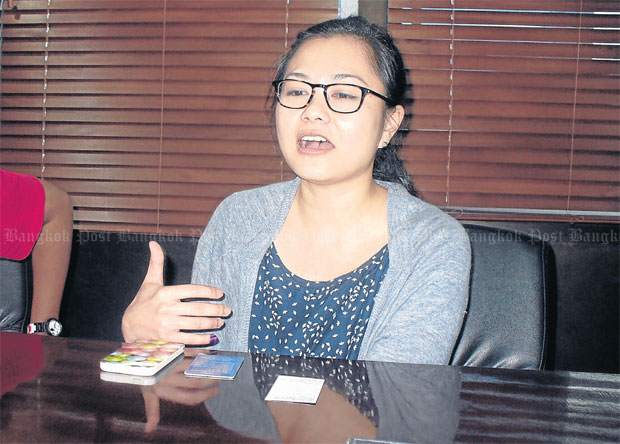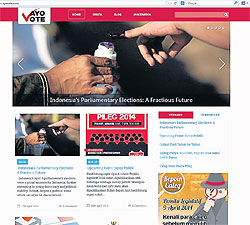Many young Indonesian voters used to take a dim view of politics and elections, but those negative perceptions may have changed, thanks largely to Ayovote.com
Pingkan Irwin, who helped found the website last July and is responsible for public relations, said the idea behind the site was to educate young people about Indonesian politics and encourage them to exercise their rights in the legislative elections on April 9 and the presidential election coming in July.

Pingkan Irwin, a founder of Ayovote. com, says the Indonesian election process is very complex and confusing, so her website uses music and entertainment to help get the message across. Photo: Anucha Charoenpo
She said she was moved to set up the site after learning that eligible voters aged between 17 and 30 years now made up a whopping 30% of the Indonesian electorate, but many lacked awareness about why elections were important, not only for them personally but for the country.
Most young voters, she said, still had negative perceptions about politics, mainly because of lack of information. But since the website was formed, their perceptions about politics and elections have improved.
“I guess the general information (about politics) is already out there but it is not communicated in a way that is easy to digest,” she said. “That’s why Ayovote was founded, to address that issue.

“The information is presented through music and other entertainment, allowing people to learn because the Indonesian election is very complex and confusing.”
Ms Irwin said her group wanted people to be able to digest information that they needed to know, in order to increase the young people’s participation to ensure that they become voters.
“We don’t want them to vote just for the sake of voting but we want them to make sure that they actually know what their options are. Take the political parties and who is in them — they don’t even know how many parties there are, they are only names, and that is a big concern,” she said.
“We encouraged everyone to find out the candidates’ backgrounds because as you can see on the election ballots, information is limited.
“In Jakarta you have to choose in three different levels of elections and outside Jakarta there are even more. There are a lot of candidates. You can’t even recognise only the names. It is so confusing and that’s why we started the campaign last year in July 2013. We addressed this issue to make sure that they will understand the process and be encouraged to participate in it. We give them proper information to help them decide the right things.”
Ayovote began as a two-person operation with Ms Irwin and a friend. More friends came on board and now there are volunteers to help when Ayovote holds events and workshops with young voters. There are now five people on the team handling website PR, strategy, content, events, business workshops and video content, as well as data and research. They are helped by 10 volunteers.
“Since last year we have received a lot of responses from our youth audiences,” said Ms Irwin. “In the beginning the challenge was the perception of young people, who think elections are not important and are boring. Once we give them information and knowledge about elections they show their interest and seek information afterward by themselves.”
She blamed the mainstream media’s daily reporting of political corruption and scandals for fostering negative attitudes toward politics and elections in Indonesia. While corruption is a plague and must be exposed, many constructive aspects of political life get ignored.
Another factor, she said, is the lack of information about politics and elections, which are seen as too confusing and complex. The media in Indonesia are very fragmented and no one media platform really targets young voters. That’s why Ayovote made a lot of media contacts and produced a lot of videos to convey electoral knowledge in a way that would attract the attention of young voters.
Staff member Disna Harvens said Ayovote found music was a useful tool for educating young people. It has also held several workshops and discussions to promote two-way communication about politics.
Now that Ayovote has gained a following and convinced young people that politics can affect them personally, young voters have higher hopes for Indonesian politics as something that could help improve their daily lives, he said.
The challenge now is for the website to sustain itself and recruit more people to work for it over the next five years. It is forming a follow-up group to monitor the work of the Indonesian government and the representatives to encourage young voters to participate even more actively in politics.
Gunawan Zukki, 37, an election monitor at polling station No 26 on Lebaburus Jl Madrasah Al-Husna in Jakarta, said he had seen the change personally. “I saw many young people coming to vote this time,” he said.
He agreed that young people were now paying attention to politics much more than in past elections. They even knew how many political parties there were and who the candidates were.
While politics might seem confusing and remote, Mr Zukki said that in his experience, people do take an interest. In the days before an election, people from all walks of life, the elderly and the young, discuss politics in their own communities.
They exchange ideas about how to choose the right parties and candidates for the legislature. They also have opinions about how to pick the best person to lead Indonesia.
In his view, voters tend to choose the party that really gets close to them and their communities, not the party that is only big in the media but may not understand the problems of local people.